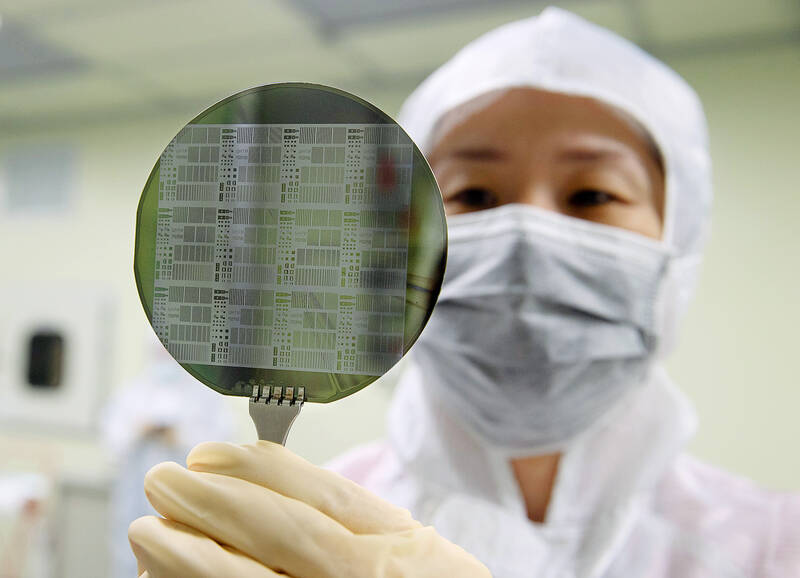The US government’s plan to widen the scope of its restrictions on the sale of US-made IC chips and production equipment to China would have only a limited effect on Taiwan’s semiconductor industry, Taiwan Institute of Economic Research (TIER, 台灣經濟研究院) economist Arisa Liu (劉佩真) said yesterday.
Liu, a Taiwan Industry Economics Database researcher at the institute, said the planned restrictions would force Chinese chipmakers to shift their focus to mature technologies, as they would likely face difficulty obtaining equipment required for the production of advanced chips.
China’s increased focus on mature processes would not hurt Taiwan, as Taiwanese chipmakers are competitive in the field and have achieved high yield rates, she said.

Photo: CNA
The nation’s semiconductor industry would not be pressured by more Chinese chipmakers using mature processes, Liu added.
Her comments followed a Reuters report on Monday that Washington would next month broaden the scope of its restrictions on US exports of semiconductor production equipment to Chinese firms that manufacture advanced chips using sub-14-nanometer processes.
The restrictions would apply to KLA Corp, Lam Research Corp and Applied Materials Inc, it said.
The companies would need to obtain permission from the US Department of Commerce before exporting advanced chip production equipment to China, the report said.
Pegatron Corp (和碩) chairman Tung Tzu-hsien (童子賢) said the planned curbs are an extension of the trade dispute between Washington and Beijing.
The planned restrictions would not cause the kind of shock that rattled the markets in July 2018, when the administration of then-US president Donald Trump imposed tariffs of up to 25 percent on US$34 billion of Chinese imports, sparking the dispute, Tung said.
The commerce department last month sent letters to US IC designers Nvidia Corp and Advanced Micro Devices Inc (AMD), ordering them to halt shipments of artificial intelligence (AI) chips to China without government permission, the Reuters report said.
Liu said the ban would have a limited effect on Taiwan Semiconductor Manufacturing Co (TSMC, 台積電), as Nvidia and AMD sell products other than AI chips to their Chinese customers.
TSMC was similarly unaffected by the sanctions Washington placed on China’s Huawei Technologies Co (華為) on Sept. 15, 2020, she said.
The chipmaker achieved this by adopting flexible sales strategies and the void left by the missing Huawei orders was quickly filled by other customers, Liu said.

In Italy’s storied gold-making hubs, jewelers are reworking their designs to trim gold content as they race to blunt the effect of record prices and appeal to shoppers watching their budgets. Gold prices hit a record high on Thursday, surging near US$5,600 an ounce, more than double a year ago as geopolitical concerns and jitters over trade pushed investors toward the safe-haven asset. The rally is putting undue pressure on small artisans as they face mounting demands from customers, including international brands, to produce cheaper items, from signature pieces to wedding rings, according to interviews with four independent jewelers in Italy’s main

Japanese Prime Minister Sanae Takaichi has talked up the benefits of a weaker yen in a campaign speech, adopting a tone at odds with her finance ministry, which has refused to rule out any options to counter excessive foreign exchange volatility. Takaichi later softened her stance, saying she did not have a preference for the yen’s direction. “People say the weak yen is bad right now, but for export industries, it’s a major opportunity,” Takaichi said on Saturday at a rally for Liberal Democratic Party candidate Daishiro Yamagiwa in Kanagawa Prefecture ahead of a snap election on Sunday. “Whether it’s selling food or

CONCERNS: Tech companies investing in AI businesses that purchase their products have raised questions among investors that they are artificially propping up demand Nvidia Corp chief executive officer Jensen Huang (黃仁勳) on Saturday said that the company would be participating in OpenAI’s latest funding round, describing it as potentially “the largest investment we’ve ever made.” “We will invest a great deal of money,” Huang told reporters while visiting Taipei. “I believe in OpenAI. The work that they do is incredible. They’re one of the most consequential companies of our time.” Huang did not say exactly how much Nvidia might contribute, but described the investment as “huge.” “Let Sam announce how much he’s going to raise — it’s for him to decide,” Huang said, referring to OpenAI

The global server market is expected to grow 12.8 percent annually this year, with artificial intelligence (AI) servers projected to account for 16.5 percent, driven by continued investment in AI infrastructure by major cloud service providers (CSPs), market researcher TrendForce Corp (集邦科技) said yesterday. Global AI server shipments this year are expected to increase 28 percent year-on-year to more than 2.7 million units, driven by sustained demand from CSPs and government sovereign cloud projects, TrendForce analyst Frank Kung (龔明德) told the Taipei Times. Demand for GPU-based AI servers, including Nvidia Corp’s GB and Vera Rubin rack systems, is expected to remain high,